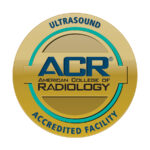Ultrasound
Service Overview
What is an Ultrasound?

Ultrasound scanning also called “ultrasound imaging” or “sonography” is a method of obtaining images from inside the human body through the use of high-frequency sound waves. The sound waves are recorded and displayed as a live image. Because ultrasound images are captured in real-time, they can show movement of internal tissues and organs, and enable physicians to see blood flow.
When is an Ultrasound Used?
Ultrasounds are used for a variety of reasons, one of the most common being during pregnancy to obtain pictures of a baby in the womb. Other common exams include:
- Abdomen
- Abdominal Doppler
- Pelvis
- Renal transplant
- Testicular
- Thyroid
- Transvaginal
- Evaluation of the kidneys, liver, gallbladder, pancreas, spleen, and blood vessels of the abdomen
- Rule out masses and aneurysms
Specialized Exams
There are a number of specialized exams ultrasounds are used for:
- Extensive diagnostic OB
- Thyroid
- Soft tissue
Because ultrasounds provide real-time images, they can also be used to:
- Guide procedures such as needle biopsies, in which a needle is used to sample cells from an organ for laboratory testing.
- Help a physician determine the source of abdominal pain, such as stones in the gallbladder or appendix, or an inflamed appendix.
- Help identify the cause of enlargement of the abdominal organ.
Doppler Ultrasound is a special type of ultrasound study that is used in the examination of major blood vessels. These images can help the physician to see and evaluate:
- Blockages to blood flow, such as clots.
- Build-up of plaque inside the vessel.
- Congenital malformations.
With knowledge about the speed and volume of blood flow gained from ultrasound imaging, the physician often can determine whether you are a good candidate for a procedure such as angioplasty.
Preparation
How to Prepare for Your Ultrasound Exam
Preparations will vary depending on the kind of exam you are having performed: For any ultrasound please plan on arriving 30 minutes prior to your appointment for patient registration.
- Abdominal ultrasound
- Nothing to eat or drink after midnight (or at least six hours prior to your exam).
- Abdominal and pelvic ultrasound (scheduled together)
- Nothing to eat at least six (6) hours prior to your exam.
- Drink 24 ounces of water one hour prior to your exam. Please do not empty your bladder.
- Pelvic ultrasound
- Drink 24 ounces of water one (1) hour prior to your exam. Please do not empty your bladder as a full bladder is necessary for your exam.
- OB (Pregnancy) Ultrasound
- Drink 24 ounces of water one (1) hour prior to your exam. Please do not empty your bladder as a full bladder is necessary for your exam.
- OB (Pregnancy) Ultrasound-2nd Trimester Only
- Drink 24 ounces of water one (1) hour prior to your exam. Please do not empty your bladder as a full bladder is necessary for the exam.
- Renal (kidney) ultrasound
- Drink 16 ounces of water prior to your exam. A full bladder is helpful, so if possible, please refrain from emptying your bladder.
- Guided biopsy of the Thyroid/Soft tissue
- Please refrain from aspirin/blood thinning products five (5) days prior to your exam.
- No other preparation required.
- Prior ultrasound needed.
The following ultrasounds do not require any preparation:
- Carotid
- Thyroid
- Venous Doppler (DVT)
- Scrotum/Testicular